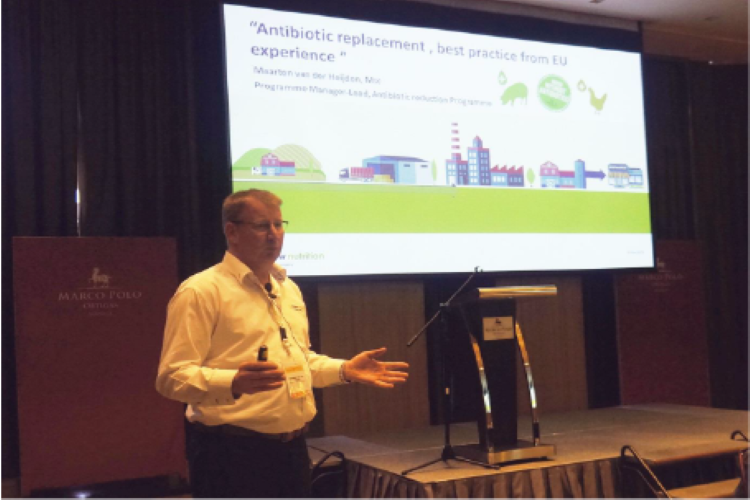We need a change in the mind-set of the industry, collaboration with experts and education to reach antibiotic reduction
- Sustainability
Trouw Nutrition Asia Pacific gathered experts and animal producers to address one of the main challenges in the industry today: how to reduce antibiotic use while keeping performance and profitability.

The concern about antimicrobial resistance is already global. Legislation on antibiotic reduction is moving forward from Europe to the rest of the world at an increasing pace. The development of strategies to reduce- and eventually phase out- antibiotics in animal production is starting to show its first and promising results for the industry. To keep up with the trends and stay in the market, feed and animal producers need to understand the scope of the issue but also to learn what is available to help them reduce antibiotics while keeping up performance.
Last week, during a series of seminars in Asia Pacific under the title “The Future Integrated Solution for Profitable AGP-free Production”, Trouw Nutrition addressed the main challenges producers are facing regarding antibiotic reduction. The events took place in Philipines, Indonesia and Thailand, where about 230 feed and animal producers of the region gathered together with key leaders on the subject.
Samson Li, Managing Director, Business Unit Nutreco Asia, in his opening notes expressed: “There is no single silver bullets that could help us fight antimicrobial resistance. In Trouw Nutrition, we want to share our experiences. For example in the Netherlands, we managed to reduce 58% of antibiotic usage in animal husbandry. We need to work closer together to overcame this issue.”
About the need of reducing antibiotic use
Keynote speakers from the FAO highlighted the importance of taking an active role in antibiotic reduction. If nothing is done, they assured, it is estimated that 10 million people will die across the world by 2050 and the cumulative lost outputs will be worth up to US $100 trillion globally.
Jon Ratcliff, consultant for the main U. K. supermarket chains on food & agriculture matters, explained the difference between therapeutic, prophylactic and growth promoter antibiotics (AGP). He highlighted that the last ones, used to increase growth, improve feed utilisation and reduce mortality, were banned in Europe between 15 and 10 years ago, being the first step towards antibiotic reduction. That trend is now being progressively observed globally, so there is an opportunity for the rest of the world to look at the European experience and introduce the necessary changes in the smartest way business wise. Besides legislation, also food consumers are already putting a lot of pressure in the industry by demanding meat without antibiotics. “Such a demand actually led to the launch of a new global certification standard for animal products: Raised Without Antibiotics”, Ratcliff explained.
The challenge for animal producers lies on keeping performance after withdrawing AGP’s. Ratcliff pointed out the importance of the quality of the environment the animal is in once AGP’s are discontinued and showed the direct relationship between improvement of animal performance and good environmental conditions. “The European experience shows that there is life after AGPs but requires an integrated approach” the expert said.
About the strategies to maintain profitability in AGP- free environments
Linked to the integrated approach concept, Maarten van der Heijden, Global Feed Additives Programme Manager for Trouw Nutrition, presented his experience on European cases. He stated that “a drastic reduction of antibiotics in food production can be achieved if we move to a new farming model based on integrated and multi-stakeholder collaboration”. Van der Heijden showcased some impressive results on field experiences where this approach was taken. By analysing data and executing audits to examine the critical points of animal production without antibiotics, they could select the right strategy. Combining Selko feed additives with feed, farm and health management advice, proved that it is possible to reduce antibiotics while keeping or even improving performance. The main outcome is an increase in profitability, as animals perform better but also the end product gets an added value in the market. “The key elements to reach antibiotic reduction while maximising profit are a change in the mind-set of the industry, collaboration with experts and education of the producers”, the Dutch expert concluded.
Maarten van der Heijden, Global Feed Additives Programme Manager for Trouw Nutrition presented his successful experience on European cases of antibiotic reduction(in picture)
About Selko
Selko is the feed additives brand of Trouw Nutrition, a Nutreco company. Selko’s portfolio consists of natural feed additive solutions that add value to integrators, feed mills and farmers. Focus areas are Salmonella control, feed safety, gut health in antibiotic-free production systems and trace mineral nutrition solutions. Selko solutions are offered as a complete package consisting of products, know-how and services. The Selko brand encompasses blends of organic acids, organic minerals, betaine and mycotoxin binders. Trouw Nutrition’s global sales organisation commercialises the Selko feed additives brand.